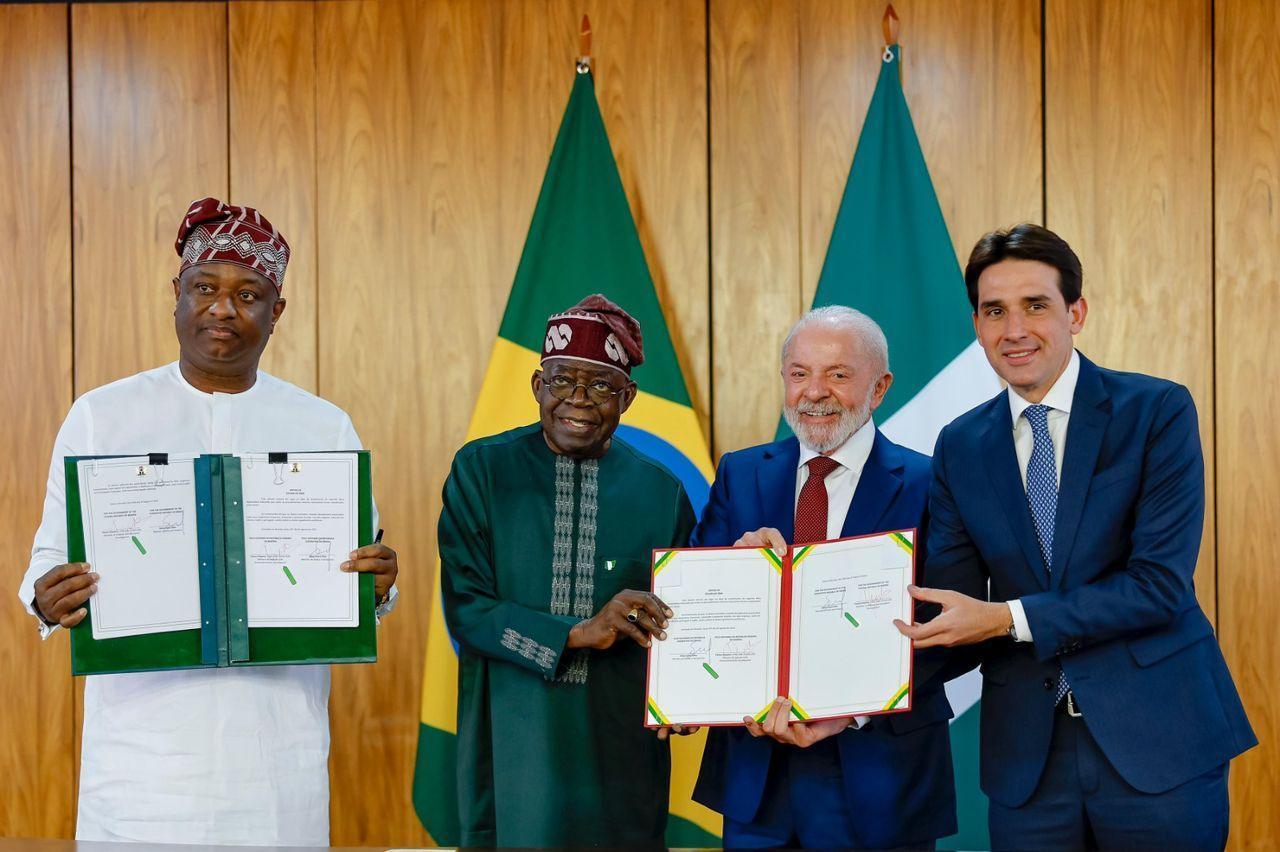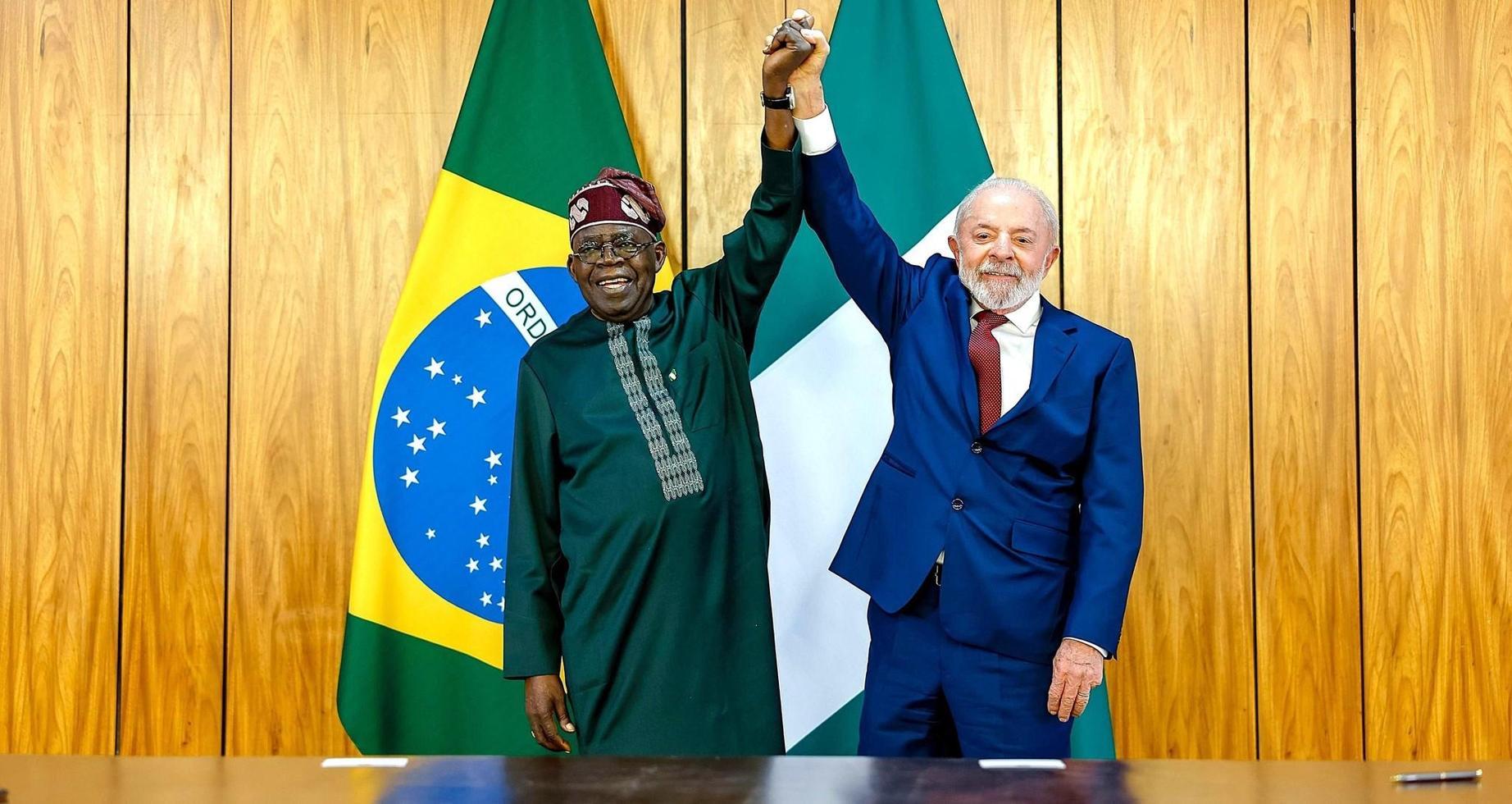By Abba Hamisu Sani
Africa-Press – Nigeria. President Bola Tinubu’s recent two-day state visit to Brazil, from 24 to 25 August 2025, has dominated Nigeria’s media space. Much analysis has focused on the five Memoranda of Understanding (MoUs) signed between the two nations, covering aviation, trade, diplomacy, science, and finance.
One highlight was the Bilateral Air Services Agreement, which will allow direct flights between Lagos and São Paulo, to be operated by Air Peace.
Another breakthrough was the imminent return of Petrobras, Brazil’s state-owned oil giant, to Nigeria—five years after it withdrew from joint ventures.
“We have the largest gas repository. So I don’t see why Petrobras doesn’t join us as a partner in Nigeria as soon as possible,” President Tinubu said at a joint press briefing with President Luiz Inácio Lula da Silva in Brasília.
Other agreements focused on political consultations, scientific collaboration, and agricultural financing through Nigeria’s Bank of Agriculture and Brazil’s National Bank for Economic and Social Development.
Why Stronger Nigeria–Brazil Ties Matter
This is Tinubu’s third visit to Brazil since assuming office as president of Africa’s most populous nation, which is also the largest country in South America.
Nigeria and Brazil share a history of high-level visits, bilateral agreements, and strategic partnerships. From trade to technical cooperation, energy to defence, the two nations have engaged in diplomatic collaboration for decades, reflecting mutual recognition of each other’s importance on the global stage.
Analysts describe Nigeria and Brazil as emerging market powerhouses with immense potential to shape the 21st century. Tinubu’s visit signals readiness to leverage shared strengths, history, and aspirations to forge an even stronger future—not just based on commonalities, but on what they can achieve together.
Biotechnology and Agricultural Cooperation
Professor Abdullahi Mustapha, Director General of the National Biotechnology Research Development Agency (NABRDA), was part of the delegation. He explained that Nigerian Minister of Innovation, Science, and Technology, Uche Geoffrey Nnaji, led three institutions under his ministry: the Biotechnology Research and Development Agency, the Space Research Agency, and the Energy Commission.
While in Brazil, these agencies visited sister institutions to establish partnerships. Under the biotechnology MoU, they engaged with Embrapa, a leading Brazilian agricultural research institution with 43 specialized centers.
“This government is working to revamp the agricultural sector. By signing the MoU under biotechnology, we will interact with Embrapa and other related institutions. We have formed a committee to strategize and bring out the best from both countries,” Mustapha said.
He described the relationship as symbiotic, with each country contributing its strengths. Areas of cooperation include crop production, pest control, drought and flood management, and other agricultural challenges.
Brazil has advanced significantly in crops such as corn, soybeans, and coffee. Nigeria, where corn is a staple, will collaborate in these areas and on other crops like sorghum.

Exploring the Cassava Value Chain
The delegation also discussed opportunities in the cassava value chain to produce bioethanol. While Brazil produces bioethanol from sugarcane, Nigeria produces large quantities of cassava, which can be used for starch and bioethanol production.
With Nigeria’s growing refinery capacity, Mustapha noted the need for at least 15–20% bioethanol blending with petroleum. He added that producing vehicles running purely on bioethanol is possible.
“This will boost the economy, create jobs, and increase exports, as many countries are seeking bioethanol,” he said.
The NABRDA Director General concluded that this is just the beginning, with more sectors to be addressed when the committee meets to develop further strategies.
On Tissue Culture Development
Professor Abdullahi Mustapha stated that Nigeria had worked with Brazil on tissue culture some years ago and is now ready to build on that relationship.
Tissue culture today can be used to address climate change, combat desertification, and provide large quantities of planting material in a short time. There is much that can be achieved with this technology.
“This is also an area we are looking into to collaborate and develop the country. The two countries have similar climates, so whatever they are doing, once we deploy it here, it will work. Likewise, whatever we are doing, if deployed in Brazil, will work there. We have so much in common. It is just water that separates us—seven and a half hours across. With this relationship, we are going to benefit a lot,” Mustapha emphasized.
Economic Prospects of the MoUs
Economic analyst Dr. Abdullahi Abubakar Gwandu said that with the various Memoranda of Understanding signed during President Tinubu’s recent visit to Brazil, both countries stand to benefit immensely.
Brazil, the largest economy in South America, is among the key developing nations. It has advanced beyond many developing countries, possesses huge resources, and has made significant progress in science and technology, with a large population.
Brazil is also a key member of the geopolitical bloc BRICS. The MoUs reached between Nigeria and Brazil, he said, will benefit Nigeria beyond expectations.
“I think most of these agreements are achievable and will be of mutual benefit to both countries. For example, in aviation, an agreement was reached to allow Nigerian airlines to operate direct flights from Nigeria to Brazil. This will help not just the Nigerian government but also the aviation sector. Once it takes effect, there will be no need to pass through Europe to reach Brazil and other South American countries,” Dr. Gwandu said.
He added that the aviation agreement will cut travel time to South America by over 70%. Instead of 20 hours, it may take just 7–8 hours to reach Brazil. The economic benefits are significant, considering the savings for Nigerian travelers.
“With this agreement in effect, all those inconveniences and high costs will be minimized,” he stated.
Oil and Gas Cooperation
Brazil has one of the largest oil companies in the world, second only to Saudi Aramco, which previously operated in Nigeria.
“I don’t know why they withdrew from the country, but with this agreement, I think they have decided to return and may even set up a refinery. That will save Nigeria a lot and protect it from foreign companies that come with a colonial mentality, imposing conditions,” he said.
Dr. Gwandu added that the return of Brazil’s oil company will diversify a sector currently dominated by American and Western European firms. These companies often represent their governments and impose various conditions, which could now be eliminated.
“I believe whatever reasons made them leave Nigeria in the past will now be resolved,” he said.
He expressed confidence that Nigeria will establish conditions and a sound economic climate to enable smooth operations. With vast oil reserves yet to be explored, Brazil’s involvement could boost the Nigerian economy, making it stronger and more consolidated.
Agricultural Sector: Brazil’s Advancement
Dr. Gwandu noted that Brazil is far ahead of most countries in agricultural mechanization, technology, and value chains.
Under the agreement, Brazil will assist Nigeria by building an assembly plant to produce over 10,000 tractors.
“Imagine what 10,000 tractors can do. In addition, they will help Nigeria produce more than 50,000 smaller agricultural implements, boosting production and productivity,” he stated.
He added that this will help Nigeria achieve food security, produce surplus for its citizens, and export to earn foreign exchange.
Brazilian Investment in Nigeria
Brazilian businessmen and the government have agreed to gradually invest more than $30 billion in Nigeria.
“Investing such an amount is enough to quickly overturn our current precarious economic condition,” Dr. Gwandu said.
Addressing doubts about feasibility, he said it is achievable because Brazil and Nigeria share similarities as developing nations with colonial histories. Both are seeking partners and looking to move away from monopolistic, imperialistic countries that impose conditions, tariffs, and restrictions.
“As I said earlier, Brazil is a BRICS member, and Nigeria has just joined as an associate. I believe Brazil will do whatever it can to strengthen ties with Nigeria,” he emphasized.
Like Brazil, Nigeria has a large economy, vast potential, a big market, and abundant resources.
“The Brazilians will be pleased to invest in Nigeria. It will not be a loss; there will be gains because what matters in business is the market—and the market, people, resources, and potential are all here. It will not be a waste of time for Brazil to tap into Nigeria’s opportunities,” he concluded.
For More News And Analysis About Nigeria Follow Africa-Press







